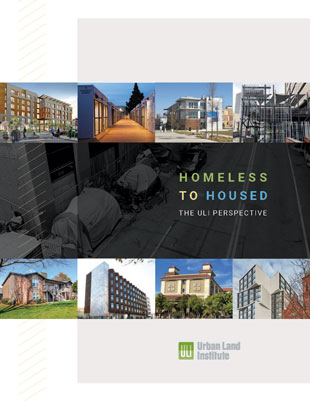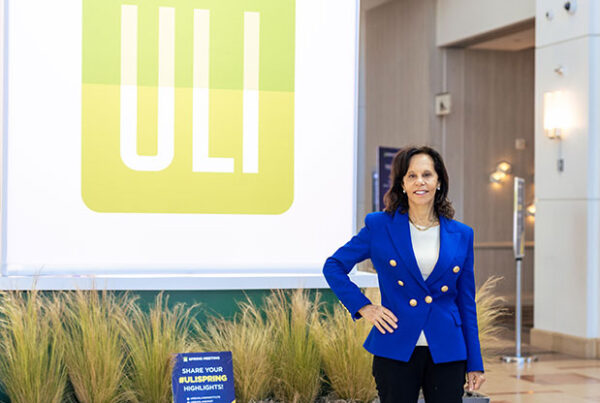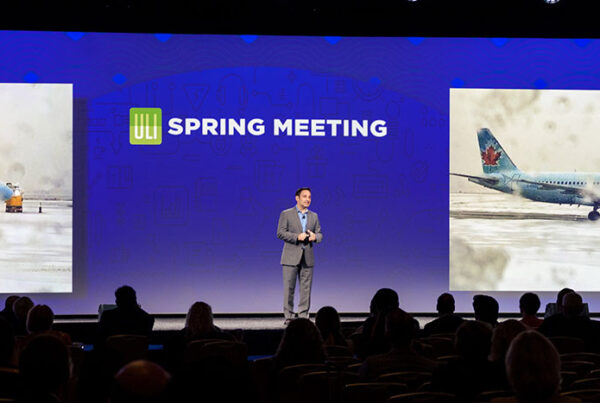Decisions made years ago to invest in new technologies—and to continually upgrade existing platforms—allowed ULI to pivot rapidly to online delivery of vital member services.
![]() When pandemic forced businesses and organizations around the world to search for ways to continue operating without face-to-face interactions, ULI quickly shifted to an online business model to serve our more than 45,000 members worldwide. A years-long investment in technology enabled ULI to continue to provide member value while reimagining the existing program of work and offerings in new and exciting ways.
When pandemic forced businesses and organizations around the world to search for ways to continue operating without face-to-face interactions, ULI quickly shifted to an online business model to serve our more than 45,000 members worldwide. A years-long investment in technology enabled ULI to continue to provide member value while reimagining the existing program of work and offerings in new and exciting ways.
The greatest lesson learned from this experience is this: technology is not just how your product gets delivered; technology is a critical part of the product itself and can be your competitive advantage.
Services Enhanced through Technology
Fundamentally, we believe that technology enables ULI to provide a continuous stream of member-facing value. Members have told us what matters to them, and we have listened.
Their need for networking is supported by our online Member Directory (members.uli.org). Those looking to be more engaged with ULI can find volunteering and leadership opportunities through the online Navigator (navigator.uli.org). And members who need access to ULI’s unparalleled content can explore the breadth and depth of our offerings using the online Knowledge Finder platform (knowledge.uli.org). In essence, Knowledge Finder is a global resource of real estate trends and best practices, delivering information that is actionable, improves decision-making and outcomes, and helps members succeed.
Among the key lessons learned from this real-world test of ULI’s capacity to function and thrive through technology are the following:
- Anticipate future needs and start building for them today. It takes time to go from concept to development to pilot to launch. The ULI Global Board of Directors, under the leadership of Randy Rowe, chairman of Green Courte Partners and ULI global chairman from 2015 to 2017, saw the need to bring together all of ULI’s content and make it easy for members to access and search. That happened more than three years ago; we are now beneficiaries of that amazing vision, which is also a key part of our Global Strategic Plan.
- A successful plan is not about the product alone. It is about building a platform that provides a critical foundation to enable continuous evolution and innovation. Successful technology-based product development builds on a true network effect: the more participants there are, the more value they bring to the rest of the network participants. Importantly, we can leverage machine learning to help with personalization of the members’ experience both while they are using the website and through automated yet personalized emails that match the members’ stated interests with suggested and recently published content.
- There is no such thing as a static technology-based product. It must change—a lot—so build an evolutionary cycle into your road map. Over the past year alone, during the challenges of the pandemic, we have added new content types to the Knowledge Finder offerings available to ULI members. These include ULI Learning programs, virtual tours, webinars, and new books. We also have added new functionality to existing online services, such as the ability to personalize the presentation of content based on a member’s stated interests, and automatic transcription of videos and webinars.
- Technology done right allows an organization to truly differentiate itself from competitors. And it allows this to be done transparently and consistently. With the use of multilingual auto-translation technology, ULI is able to deliver on its global brand promise and truly connect members and content anywhere in the world. Though our websites have been multilingual for the past few years, we just launched auto-translation from English to Japanese in Knowledge Finder, with Chinese, French, Spanish, and German on the schedule for this fiscal year.
Fundamental Decisions Set the Stage
One important decision we made about 30 months ago was to move away from the BlueJeans videoconferencing platform—which had proved unpopular among members and staff alike—to a relatively new company that offered high-definition-quality video meetings and an easy-to-use interface: Zoom. We could not have predicted the explosive growth in webinars over the past year—increasing from 24 webinars offered per quarter to almost 800, while sustaining 98 percent customer satisfaction, according to survey results.
Our technology stack and ecosystem have matured significantly. Just in the past couple of years we delivered global implementation of the Microsoft Dynamics CRM (customer relationship management) system, added a new ULI Learning management system, a new ULI Awards management platform, and a new on-site registration system. We also launched YooPay, a China-based platform that is integrated with WeChat—a Chinese messaging, social media, and mobile payment app—for both payments and marketing.
Transforming our major conferences into virtual-only events was a mega-endeavor that presented the need to devise a virtual experience that could deliver as much of the in-person feel and networking opportunities as possible. Selecting a platform that would serve the needs of speakers, attendees, sponsors, and staff was challenging enough; doing so in a matter of weeks was truly remarkable. We have used the platform, Social27, first in the Asia Pacific region for the REImagine conference in September, followed by the ULI Virtual Fall Meeting in October, and we will deploy it again at the ULI Europe Conference, February 8–10.
With every execution of these technologically enabled programs, we are learning and improving. Our technology continues to evolve along with the demands facing the organization. Lessons learned from one deployment inform the decisions going forward. After all, sharing “lessons learned, mistakes made” is the ULI way.
ADAM SMOLYAR is ULI chief marketing and technology officer.




